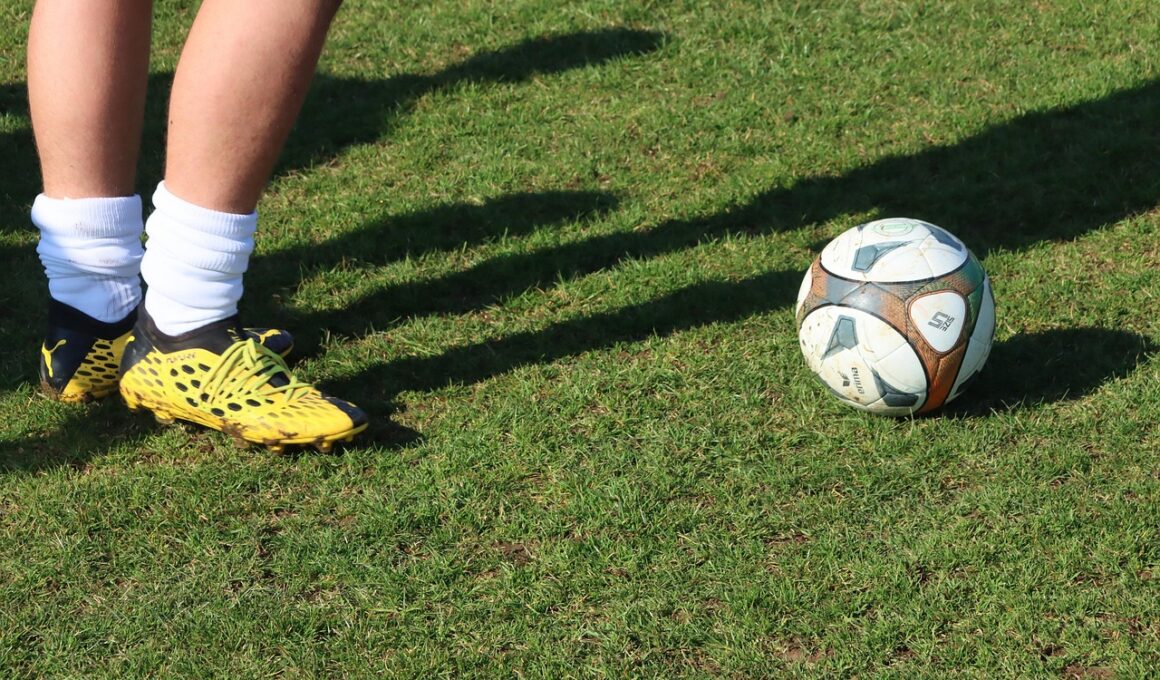Designing Off-Season Soccer Training Programs
Off-season soccer training programs are crucial for players who seek to enhance their skills, maintain fitness, and avoid injuries. A well-structured training program can vary in focus, depending on the objectives of the team and individual players. It’s essential to emphasize physical conditioning, technical skills, tactical knowledge, and psychological readiness during this time. Coaches should incorporate flexibility and strength training, as these will improve balance and reduce injuries. Moreover, recovery sessions should be included to help athletes de-stress and rebuild muscle. Strength training should consist of both bodyweight exercises and resistance training. Examples include squats, lunges, and core stability routines. Coaches should design drills that promote players’ ball control and passing accuracy. Additionally, include small-sided games to help develop game intelligence and decision-making skills. Each practice session should be systematically recorded, ensuring consistent player development. Integrating video analysis may also provide insights into players’ performance feedback. Overall, an effective off-season program fosters improvement, teamwork, and readiness for the next competitive season.
Creating a detailed training plan is essential for achieving the desired outcomes during the off-season. Coaches need to set clear, measurable goals for both individual players and the team as a whole. Examples of goals could include improving fitness levels, mastering specific technical skills, or enhancing tactical awareness. Regular assessment of players’ progress is vital for determining if the objectives are being met. A combination of aerobic and anaerobic conditioning should be woven into training sessions. Furthermore, incorporating rest days in the schedule will greatly improve recovery. During this period, it is highly beneficial to conduct periodic evaluations to gauge individual development. Emphasizing player feedback along with performance metrics will create an open line of communication between players and coaches. Coaches should also encourage a competitive environment where players can challenge each other in drills. This positive competition fosters improvement and camaraderie among teammates. Emphasizing nutrition is imperative; providing players with dietary guidelines can enhance performance and recovery. Ultimately, well-structured goals and regular evaluations will lead to significant improvements by the time the new season arrives.
Physical Conditioning and Strength Training
Physical conditioning is at the heart of an effective soccer training program during the off-season. Focusing on cardiovascular fitness, agility, and strength is vital for optimal performance. Conditioning should include running drills that focus on both endurance and sprinting. This dual focus ensures players can sustain their energy during matches and outrun opponents when necessary. Furthermore, strength training should include compound movements that engage multiple muscle groups, improving overall body fitness. Techniques such as weightlifting, resistance bands, and plyometrics should be emphasized. Coaches should ensure that athletes learn proper techniques to avoid injuries. Incorporating flexibility training, such as yoga or dynamic stretching, will enhance players’ mobility and resilience. A comprehensive warm-up routine should precede every training session to prepare the body effectively. Coaches should also monitor heart rates and recovery times to assess players’ conditioning levels. Adapting individual regimens based on player feedback and performance enables coaches to create personalized pathways for development. Thus, a solid foundation for physical conditioning sets the tone for effective skill acquisition and tactical understanding during training.
Incorporating technical skills into the training program is equally important for players’ development. Techniques such as dribbling, passing, shooting, and ball control should be practiced regularly to improve proficiency. Small group drills promote individual attention, allowing players to work on specific weaknesses. Coaches can utilize various formats, including one-on-one drills, which provide personalized feedback. Emphasizing ball mastery through various challenges will motivate players to practice self-training. Encouraging creativity and finding unique solutions in game situations will also foster players’ adaptability. Utilizing technology, such as apps for tracking progress or recording drills, can engage players, making training interactive. Coaches can showcase videos of professional players, analyzing their techniques to inspire players. Gradually, increasing the complexity of drills ensures continual skill development. Players should also participate in small-sided games to practice their technical skills under pressure. This practice simulates real game environments effectively. Providing constructive feedback during and after drills can guide players toward improvement. Collectively, these technical training elements build a solid foundation for individual player proficiency and contribute to effective team dynamics.
Tactical Understanding and Strategic Development
Tactical understanding is a crucial aspect of developing well-rounded soccer players during the off-season. Coaches should emphasize the importance of strategic thinking and positioning throughout training sessions. Players must develop a comprehensive understanding of their roles within the team, including how to make smart decisions during gameplay. Coaches can utilize video analysis of previous games, highlighting tactical decisions and formations used by successful teams. This approach provides a valuable learning opportunity for players during off-season training. Encouraging players to engage in discussions about tactics and strategies fosters a deeper understanding of the game. Setting up game scenarios during practice can also enhance players’ ability to react and adapt to different situations, requiring quick thinking and teamwork. Coaches can create drills that simulate various formations and strategies, allowing players to explore the impact of tactical decisions. Group discussions and reflection sessions can further facilitate learning, enabling players to express their perspectives. Combining tactical education with skill development reinforces a comprehensive understanding, ultimately leading to better performance during the competitive season.
Psychological preparation should not be overlooked when designing off-season training programs for soccer players. Developing mental resilience is essential for achieving peak performance during competition. Coaches should emphasize the importance of a positive mindset and effective goal setting. Techniques such as visualization and mindfulness can help players manage stress and stay focused. Regular motivational talks can inspire players, fostering a strong team mentality throughout the off-season. Players should recognize the importance of mental toughness and learn strategies for overcoming challenges. Incorporating teamwork-building activities fosters camaraderie and trust among teammates. Additionally, nurturing self-reflection allows players to identify their strengths and weaknesses, paving the way for personal growth. Engaging players in leadership exercises can further develop their confidence and decision-making abilities. Coaches may also consider integrating sports psychology professionals to provide specialized insights. Building a supportive environment where players can express their concerns and challenges enhances psychological well-being. Thus, addressing mental and emotional aspects complements physical training, ensuring players are well-prepared for the upcoming season.
Monitoring Progress and Creating Accountability
Regular assessment and monitoring of players’ progress during off-season programs are vital. Coaches need to establish a robust feedback mechanism that allows for tracking individual and team improvements. Utilizing performance metrics such as fitness tests, skill evaluations, and personal bests can help players identify areas that require extra attention. Progress should be documented consistently, and this data can guide training adaptations. Establishing accountability through individual training logs creates motivation among players. Coaches can encourage players to set specific, measurable objectives and regularly check in on their progress. This collaboration fosters a growth mindset and creates a sense of ownership within the players. During evaluations, coaches should provide constructive feedback, celebrating achievements while identifying areas for improvement. Including peers in the evaluation process encourages a supportive team environment. Moreover, leveraging technology to track performance allows players to visualize their progress, enhancing engagement. Coaches should adapt the training structure based on assessment results to ensure continuous growth. Collectively, a well-monitored training program promotes transparency, accountability, and motivation for players, refining their skills and readiness for competition.
In conclusion, designing effective off-season soccer training programs is a multifaceted approach emphasizing physical, technical, tactical, and psychological aspects. Coaches play a significant role in creating environments that promote personal growth, teamwork, and development. Careful planning of training sessions should ensure players remain motivated and engaged throughout the off-season. Incorporating varied drills that promote skill acquisition while considering individual player needs and overall team objectives is essential. It is also essential to build relationships with players, establishing trust and identifying areas of improvement. By continuously monitoring progress and adapting training methods, coaches can optimize player development. Furthermore, integrating technology and specialized insights enhances the training process. Ultimately, the goal of a well-designed off-season program is to prepare players thoroughly for the competitive season ahead. Players emerge not only as more skilled athletes but also as mentally resilient individuals ready to take on new challenges. Stronger team dynamics developed during this time can translate into improved performance on the pitch. A well-rounded training program yields dividends both on and off the field, ultimately leading to mastery of the sport and life lessons.


